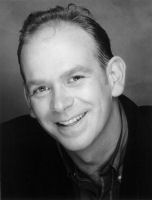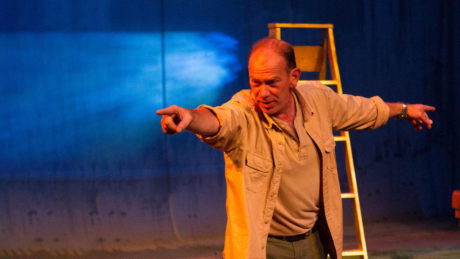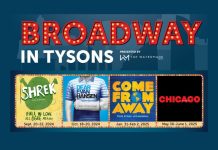Tomorrow – Thursday, January 12, 2017, master storyteller Charlie Bethel returns to Charm City to perform his newest adaptation – a one-man show of Jack London’s The Call of the Wild at Baltimore Theatre Project. Readers may remember Charlie’s previous visits to Theatre Project, where he garnered rave reviews performing his other adaptations, including The Odyssey, Beowulf, and The Seven Poor Travellers.
I was able to catch up with Charlie via email to discuss his work and and his latest piece, The Call of the Wild, which plays tomorrow through January 29th.

Patricia: How long have you been adapting and performing classic literature?
Charlie: I went to a famous theater school in the 1980’s and had to do a solo show there as a part of my third-year training. The show itself was a bit lame as I was only twenty, and it was only my first solo show, a 35-minute cabaret with the Devil. Plenty of classical literature on that, so no problem with the writing (is it plagiarism or mere research?). To me, I’m not really a writer. I consider myself at best an editor or an adapter, and at worst, a robber of the graves of the public domain.
How did you get into doing it?
Woof. THAT’s a story. OK, when I lived in Chicago in the 90’s, I got an idea to adapt Beowulf as a solo show. It already is a solo show, and the writing is mostly in the public domain; it’s totally a cool story with epic aspects that were also relating to the whole Robert-Bly-Iron-John thing in the air at the time. The process took forever. Seven years after I began adapting, I had given up as an actor, become a stage manager, and only rehearsed Beowulf in secret. Then in August of 2001, a theatre I was working for in Minneapolis asked me to come up with a “Monday Night Series.” Here were the parameters: the artist or group would market and produce a Monday Night show on their stage with a fifty/fifty split of the box; no reconfigs of lights or sound or scenery; bring your own Stage Manager unless the show is really simple; full front of house staff supplied by the theatre – you know concessions. I had no takers, but I also knew you could do such a show as Beowulf under such a model, so I did it. It went well, and I continued.
The math is fuzzy. Did I get into solo performing in 1986 as the Devil, singing “My Heart Belongs to Daddy,” or in 1994 when I decided on Beowulf as a good choice, or was it the second show, or the third show, or the fourth show? I don’t know. Every time it’s different.
What stories have you adapted for the stage?
Officially, I have performed Beowulf, Gilgamesh, The Seven Poor Travellers, Tom Thumb, or the Tragedy of Tragedies, The Odyssey, and now The Call of the Wild.
That was as an adult. As a child, I performed solo at adult cocktail parties: I could do Bill Baird’s The Man in the Moon, Oink: the Pig with the Straight Tail and some portions of Alice in Wonderland. Like the von Trapp kids, I was also required to sing. “Mister Moon, Mister Moon, You’re Out Too Soon.”
What criteria do you use to decide if a book or story is a good one for adaptation and solo performance?
It must be a part of the public domain. I can rewrite or rearrange, but I have to start in the public domain. If I write something truly original, some people will have to die first. Otherwise, you are simply stuck with my sonnets. And there’s a whole population of women out there who might warn you against that.
It must have epic flavors in it. The bigger, the better. I’m a big fan of Joseph Campbell’s take on story and epic. Story heals us, instructs us in ways not fully understood, and is on par with the best that religion, sex, drugs or rock and roll have to offer.
The performance must be contained within a timeframe of no longer than forty-five minutes to an hour of performance-time at one throw. And preferably keep it to an hour and leave it at that. If you need to do more than this, make it really interesting and provide a break. Nobody wants to listen to anybody for a really long time.
It must connect emotionally to both the teller and the listener.

The Call of the Wild started out as a serialized story in The Saturday Evening Post in the summer of 1903. It has since been made into a book, a play, a musical, a movie, and now, a one-man show. Is there something in particular about this story that inspires people to adapt it?
“The Call of the Wild” speaks to us on many levels: it’s for animal lovers, American Dreamers, Klondike tough guys, and all that. It has the Joseph Campbell hero’s cycle, and what’s not to love there? You can’t NOT root for the protagonist AND you get to boo at the bad guys. AND it’s public domain: the writer is no longer in it for the money.
Mythic Journeys says “Charlie Bethel never met an epic he didn’t like.” Beowulf, Odysseus, Gilgamesh… it sounds like they might be onto something. What attracts you to these types of stories?
That’s complicated. There was a childhood dream, an actual sleeping dream in which I learned something very important about the value of stories. Take me to dinner and I’ll tell you.
In researching for this interview, I saw organizations all over the country claiming you. Where are you actually based now and are you a regular member of any theater company?
I’m not sure any one would claim me, and I certainly don’t have a current residence. I travel and tell. I am not a regular member of any theater company, and I have not owned a bed in years. Stray cats love me.
We’re lucky in Baltimore to have you come to Theatre Project every year around Christmas/New Years. Do you have other cities where you tend to perform at the same time each year?
YOU’re lucky! Ha. I love Baltimore. As for other cities: Orlando sometimes in February, Minneapolis in early spring but not for a while, Mesa in early Fall, the odd end of summer festival sometimes somewhere crazy, myth hippie campfires in upstate New York. It’s a bit jumbly.
Between visiting artist shows and festivals, how much of the year do spend touring? What do you do when you’re home?
I like sailing, fishing, cats and warm nights by the fire. I get a lot of travel. My frequent flier miles would astound you and my dirty socks might make you pity me.
I read that a few years ago you took on 30 roles in This Wonderful Life, a one-man version of It’s a Wonderful Life adapted by Steve Murray and Mark Setlock. Are you exclusively a solo performer, whether it’s your writing or another artist’s?
Yes, a few years back a couple of theatres had me do the Murray/Setlock play – one in New Jersey and one in Washington State. It was fun both times. The play is, well, as wonderful as it’s wonderful namesake. I don’t usually perform other people’s work, but that was a hard one to resist, especially considering how well I can do Donna Reed.
Currently, I do perform almost exclusively solo. I love ensemble work and would do it in a heartbeat except there are so many neglected, old stories out there I feel I need to attend to.
But sure, if you offered me Jacob Marley for a Christmas gig, I’d totally take it in a New York minute.
What are some of the challenges and rewards of touring as a soloist?
Challenges include travel fatigue, lack of clean socks, failing to remember people’s names, losing your luggage, and everything negative that might be associated with an airplane or a hotel. Specific to being a soloist, there is the constant need to be flexible. Is this a theatre or a bar, a school or a private event? You get the idea.
Rewards are that I get to meet many, many good and nice people, plus all of the positive things associated with airplanes and hotels (free soap, conversations with interesting people, hungry stray cats I feed). Children send me drawings of the images I help make in their minds. I get to see the country, listen to the heartbeats of the earth and, by the way, I hear the crab cakes out in your neck of the woods are awesome. Looking forward to it.
What’s next for you after you close the Baltimore show?
I have a private event in Florida, and a possible road trip to Taos if the weather is good. I have an urge to learn Navajo and Lakota. As for my next story to tackle, I’m still sorting my choices, but if there’s anyone out there who wants to go to lunch with me and talk about The Kalevala, well, I’d be seriously inclined to go and have that lunch.
The Call of the Wild plays through Sunday, January 29, 2017 at Baltimore Theatre Project – 45 West Preston Street, in Baltimore, MD. For tickets, call the box office at (410) 752-8558, or purchase them online.




